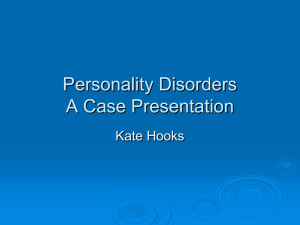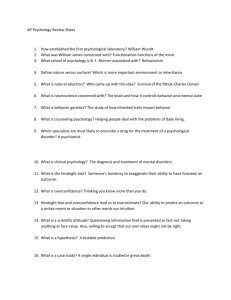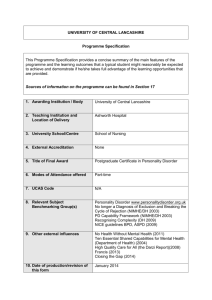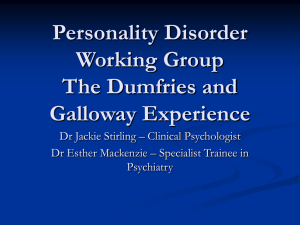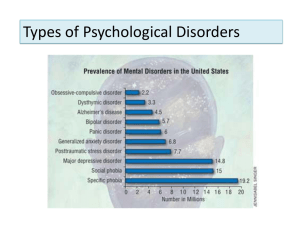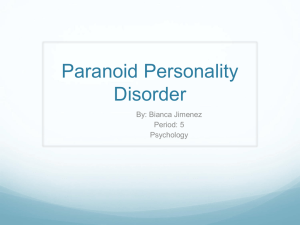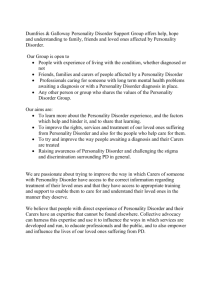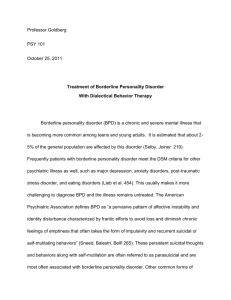Cert Introduction to Personality Disorder (Sept 2014)
advertisement
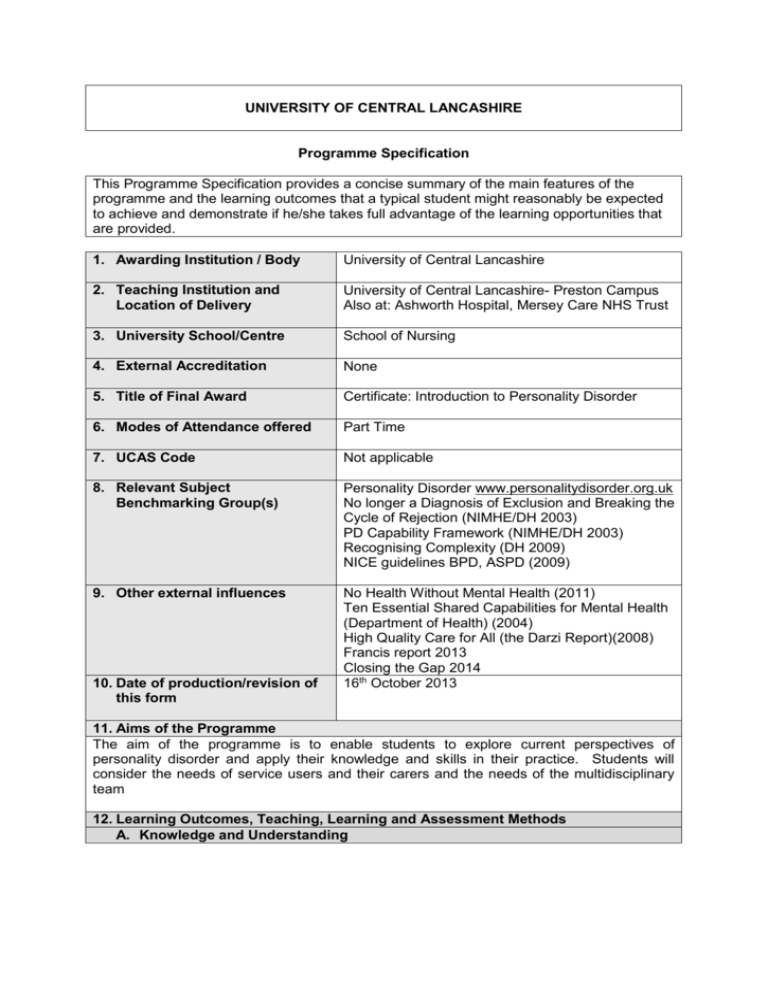
UNIVERSITY OF CENTRAL LANCASHIRE Programme Specification This Programme Specification provides a concise summary of the main features of the programme and the learning outcomes that a typical student might reasonably be expected to achieve and demonstrate if he/she takes full advantage of the learning opportunities that are provided. 1. Awarding Institution / Body University of Central Lancashire 2. Teaching Institution and Location of Delivery University of Central Lancashire- Preston Campus Also at: Ashworth Hospital, Mersey Care NHS Trust 3. University School/Centre School of Nursing 4. External Accreditation None 5. Title of Final Award Certificate: Introduction to Personality Disorder 6. Modes of Attendance offered Part Time 7. UCAS Code Not applicable 8. Relevant Subject Benchmarking Group(s) Personality Disorder www.personalitydisorder.org.uk No longer a Diagnosis of Exclusion and Breaking the Cycle of Rejection (NIMHE/DH 2003) PD Capability Framework (NIMHE/DH 2003) Recognising Complexity (DH 2009) NICE guidelines BPD, ASPD (2009) 9. Other external influences No Health Without Mental Health (2011) Ten Essential Shared Capabilities for Mental Health (Department of Health) (2004) High Quality Care for All (the Darzi Report)(2008) Francis report 2013 Closing the Gap 2014 16th October 2013 10. Date of production/revision of this form 11. Aims of the Programme The aim of the programme is to enable students to explore current perspectives of personality disorder and apply their knowledge and skills in their practice. Students will consider the needs of service users and their carers and the needs of the multidisciplinary team 12. Learning Outcomes, Teaching, Learning and Assessment Methods A. Knowledge and Understanding A1. Apply current theories and models when interacting with service users with personality disorder A2. Understand national policy and legislation related to personality disorder and deliver appropriate care strategies Teaching and Learning Methods Use of lead lectures/presentations, staff led workshops, facilitated role play and provision of directed reading and reflection. Promote work based supervision systems to support engagement with practice issues. Students will be required to present a current case to promote shared learning and positive attitudes towards to people with personality disorder. This will enable a formative feedback opportunity. This module is supported with elearn and students will be directed to specific study skill sites to support the development of their case study and oral presentation skills A service users contributes to the development of teach of teaching and learning strategies. Assessment methods Case Study B. Subject-specific skills B1. Appraise a range of risk assessment and management strategies to ensure the safety of the service users and staff B2 Explore professional boundaries, ethical practice and the conduct of the therapeutic relationship to enhance insight into the dynamics of the helping relationship. B3. Recognise behaviours presented by individuals with personality disorders in order to minimise the impact on members of the multidisciplinary team. C. Thinking Skills C1. Clarify personal and professional beliefs, values and attitudes in order to establish personal presence and influence whilst maintaining personal integrity. C2. Articulate appropriate values and responsible attitudes in order to promote social inclusion of people with personality disorder. Teaching and Learning Methods Use of lead lectures/presentations, staff led workshops, facilitated role play and provision of directed reading and reflection. Promote work based supervision systems to support engagement with practice issues. Students will be required to present a current case to promote shared learning and positive attitudes towards to people with personality disorder. This will enable a formative feedback opportunity. This module is supported with elearn and students will be directed to specific study skill sites to support the development of their case study and oral presentation skills. Service users contribute to the development of the teaching and learning strategies. Assessment methods Case Study D. Other skills relevant to employability and personal development D1. Support practice development within the multidisciplinary team and across agencies to improve the service user pathway of care towards recovery Teaching and Learning Methods Use of lead lectures/presentations, staff led workshops, facilitated role play and provision of directed reading and reflection. Promote work based supervision systems to support engagement with practice issues. Students will be required to present a current case to promote shared learning and positive attitudes towards to people with personality disorder. This will enable a formative feedback opportunity. This module is supported with elearn and students will be directed to specific study skill sites to support the development of their case study and oral presentation skills. Service users contribute to the development of the teaching and learning strategies. Assessment methods Case study 13. Programme Structures* Level Module Code NU2045 Module Title Level Introduction to Personality 5 Disorder 15. Personal Development Planning 14. Awards and Credits* Credit rating 20 Certificate Requires 20 credits at Level 5 According to QAA (2004), Personal Development Planning (PDP) is: A structured process that is integral to higher level learning Concerned with learning in an holistic sense (academic and non-academic) Something done with guidance and support A process that involves reflection, creation of personal records, planning and monitoring progress towards achievement of personal objectives Intended to improve the capacity of the individual to communicate their learning to others who are interested in it (academic staff/ employers) This is a multi-agency course that pre-dominantly attracts students from health and social care who bring with them models of support and supervision in their workplace. All students are appraised annually within their employment. In order to enhance individual personal development planning students will be encouraged to develop their learning contract with their chosen mentor identifying areas for development during and after the course. During the course students will be supported in this process through negotiated discussions, tutorials, interactions and assessments. This will help them to explore and record their progress and to set goals and devise action plans to meet their needs thus extending their personal and professional development. 6. Admissions criteria Programme Specifications include minimum entry requirements, including academic qualifications, together with appropriate experience and skills required for entry to study. These criteria may be expressed as a range rather than a specific grade. Amendments to entry requirements may have been made after these documents were published and you should consult the University’s website for the most up to date information. Students will be informed of their personal minimum entry criteria in their offer letter. This module will admit any employee from the field of health and social care. They must have the support of their line manager and be able to demonstrate on the application form that they have access to people suffering from a personality disorder. Independent practitioners are welcome and may be asked to provide a reference. 17. Key sources of information about the programme Fact sheet University of Central Lancashire website CPD prospectus 18. Curriculum Skills Map Please tick in the relevant boxes where individual Programme Learning Outcomes are being assessed Programme Learning Outcomes e.g. LEVEL 5 Module Level Code Module Title NU2045 Introduction to personality disorder Core (C), Compulsory (COMP) or Option (O) core Knowledge and understanding A1 A2 Subject-specific Skills B1 B2 B3 Thinking Skills Other skills relevant to employability and personal development C1 C2 D1 Note: Mapping to other external frameworks, e.g. professional/statutory bodies, will be included within Student Course Handbooks
